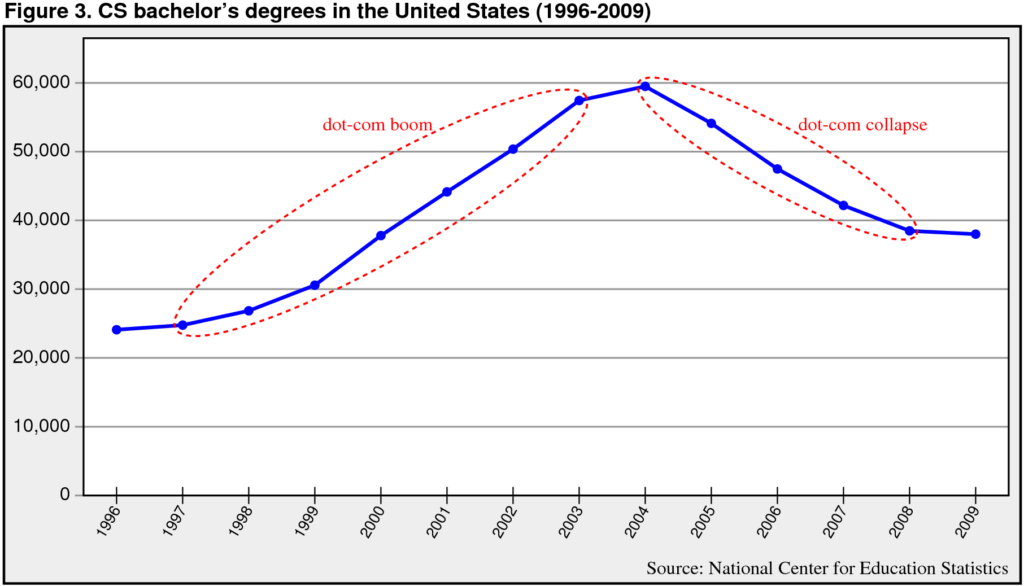There are two main concerns with H1B visas. The first problem is taking away jobs from Americans. The second problem is the decrease of wage on competitive jobs because of cheap labor from hiring foreigners. I shall address my opinion on both matters.
On the first issue, many make an argument on the matter by making simple math. “The inflow of guest workers is equal to half of all IT hires each year and fully two-thirds of annual hires of workers younger than 30…At the same time, U.S. colleges are graduating more than twice as many science, technology, engineering and math (STEM) graduates than the number of STEM openings generated by our economy each year” (PBS).
However, people making these studies must realize that not all college graduates are made equal. Despite the apparent stalling in the rise of programmer’s wage, programmers still boast one of the highest paying salaries; even in early careers. There is great incentive for people to take on computer science, computer engineering, and other computer related majors while in college. Not only is the pay good, but there is constant rhetoric on the lack of programmers on the work force. Add all this together, and it makes for a highly attractive and seemingly easy career path. However, this is not the case. Along with other STEM related fields, computer science is not an easy way to success. A degree in Computer Science doesn’t cut it to land you a job. You need to demonstrate competence through your work in various projects and by passing a rigorous technical interview process. The needs are high, and the needs can’t be easily met.
Paul Solman argues “Our fieldwork finds that reports of hiring difficulties often reflect unrealistic expectations and sometimes strategic posturing. Traditionally, during tight labor markets, such as before the dot.com crash, employers will hire good candidates who may not be “perfect,” but the firms will invest in training them.” However, anyone who has attended tech interviews can tell you that these interviews rely on the knowledge of two of the most fundamentals pieces of courses for any programmer: algorithms and data structures. These two elements make up the foundation for any capable programmer. If someone with a four-year education in the field cannot meet those basic requirements, no kind of training will do. This is no secret either. Tech companies are adamant in relaying the message that applicants need to be capable in algorithms and data structures. If you refuse to practice and learn these skills, it may show that you don’t care enough.
On top of this, despite Solman’s claim, I have found that in my search for a job that most companies do go over a training period with their new employees, especially for those straight out of college. This training will go over the specifics of a company and the specific technical knowledge necessary for the job, but just as you wouldn’t expect to train an EE graduate on how a circuit works, you shouldn’t expect to train a programmer on how to write an algorithm.
The other claim is the hiring foreign workers lead to a decrease in overall wages to workers in IT. There is clear evidence that wages in IT have remained stagnant for the last couple years. However, H1B can’t be the only reason for this. While there is still a shortage of tech workers today, back in the mid 2000’s there was certainly an even greater scarcity of IT workers. It is naïve to expect wages to remain proportionally high when the lack of supply of tech workers has at least been partially met. While tech companies still have a need for more capable employees, the need has been met to a point that they can bear to wait for the right candidate. The candidate will come eventually.
This wasn’t true in the mid 2000’s. While interest in CS had risen rapidly in the late 90’s and early 2000’s in the dot-com boom, there was a sudden dot-com collapse that happened in 2004 (see figure below). As the demand for tech workers exploded around this time, universities had trouble keeping PhD students to teach their classes. Most PhD students, attracted by the high paying job offerings, decided to leave Academia completely. This left many universities struggling to keep a CS department. Suddenly, students couldn’t find strong CS programs at Universities, forcing them to search careers in other fields. This, in turn, caused a massive shortage of tech workers across the country. It took years to overturn this shortage. Thus, it is no surprise that wages for tech workers at the time were comparatively high.

Despite all this, there is some truth to the claims made. Companies like Infosys have taken the wrong approach towards H1B visas. Their business strategy is clearly that of selling underpaid foreign works to perform cheap work for other companies. This was never the spirit and intention of H1B visas. The approach of these companies is wrong. Not only have they violated laws of H1B regarding equal pay, but they have undermined the hard work of other capable foreigners who try to come to the US seeking a competitive salary. On top of this, they hoard the lottery ticket process, making it impossible for smaller companies to even get a chance at hiring needed foreign skills.
Given all this, while I believe H1B migrants are a vital part of the economy, I do believe that reform is necessary to avoid the abuses by a minority of the companies, which unfortunately take a majority of the visas. First off, I completely agree that the lottery system should be removed. It is ridiculous to take all workers equally and make it a simple lottery. It is a great way to dissuade the best of candidates. While the US is currently the greatest tech giant, other countries are slowly starting to grow in the industry. More and more foreign skilled workers may deem it more worth it to work in other foreign countries with almost comparable pay than to enter a hostile environment towards foreigners. Rewarding the most capable is the best way to attract those with the skills the US needs.
The concern with this is what to replace the lottery system with. Some have suggested simply raising the salary cap from $65,000 to $100,000. This is most certainly not a solution. While it would certainly be a solution to a problem, it would damage smaller companies that also need to meet their needs with foreign workers. Medium gives a perfect solution. Make a whole new visa that is for outsourcing companies and cap them separately from non-outsourcing companies. Such a system would certainly be a great approach to solving this issue.
Another problem with the current H1B visa is the power that it gives to companies over their foreign employees. They can’t openly leave a company because doing so would force them to leave the country. This gives them little power to request for a hire wage or to find a job with a more competitive offer. Two possible solutions to this problem have been proposed. The first one involves expanding the green card program to allow more H1B visa workers to become legal residents. The other one involves allowing a grace period in which a worker may leave a company and legally live in the US while looking for a new job. While some people may feel aversion towards empowering foreigners in the country, this would help end the abuse of outsourcing companies which bank of the abuse of this lack of power.
While there are many proposals in place, there has been little action by the government. Currently, only uncertainty abounds.
